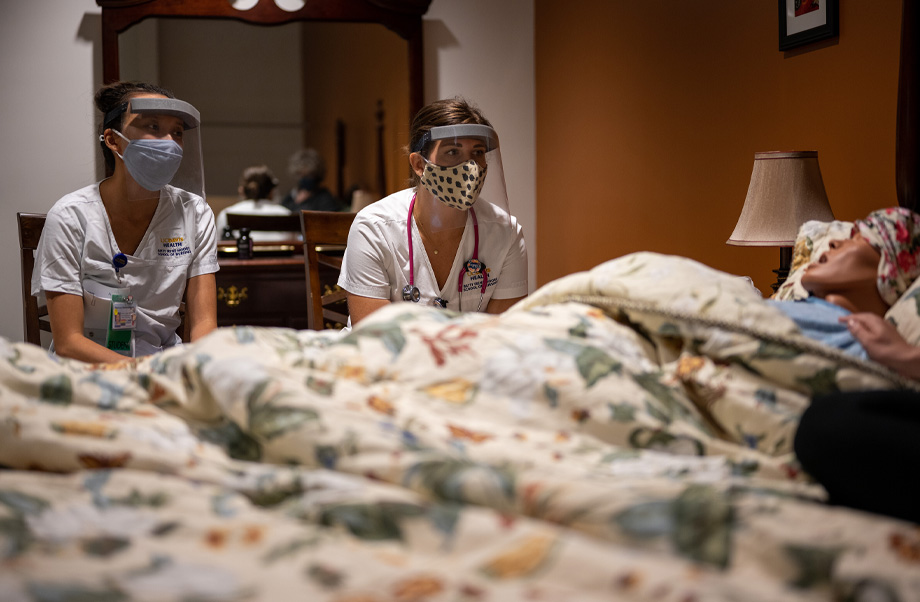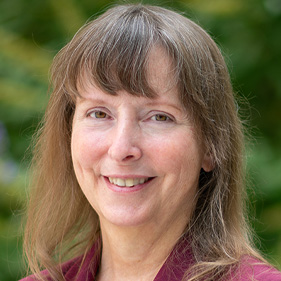November is National Family Caregivers Month, a time to recognize and honor the more than 40 million family caregivers across the country.
(SACRAMENTO)
Currently, one in five households provides care for a family member or friend. That number is expected to be one in three within 20 years — an increase that all but ensures the next generation of nurses will work with more family caregivers in the future.
Faced with that reality, Professor Sara Hart and a team from the University of Utah College of Nursing Family Caregiving Collaborative examined the representation of family caregiving in a set of foundational documents that shape nursing education and practice.
"Not surprisingly, but unfortunately, there were none," Hart said.
Amplifying the impact
The Utah team presented those findings at a 2020 caregiving summit hosted by the Family Caregiving Institute at the Betty Irene Moore School of Nursing at UC Davis. They teamed up with institute educators and curriculum experts to ensure all future nurses have the knowledge and skills they need to work with family caregivers.
"When you think of family caregiving, you think of UC Davis," Hart said. "It was a natural partnership that magnifies the impact of the work."
Kathryn Sexson, who serves as associate director of education for the institute, jumped at the opportunity to create the Consortium for Family Caregiving in Nursing Education to collaborate on caregiving competencies for prelicensure nursing programs.
Current curriculum touches on family caregivers but not at the level of detail and nursing-specific language we need.-Kathryn Sexson, associate director of education for the Family Caregiving Institute
"Current curriculum touches on family caregivers but not at the level of detail and nursing- specific language we need," Sexson explained. "We're making the linkages to the interprofessional competencies in family caregiving that are not readily apparent in the American Association of Colleges of Nursing (AACN) Essentials."
The essentials outline the necessary curriculum content and expected competencies of graduates from baccalaureate, master's and Doctor of Nursing Practice programs.
Making the case
The 2018, the RAISE Family Caregivers Act directed the secretary of Health and Human Services to develop a national family caregiving strategy identifying actions for recognizing and supporting family caregivers. This national strategy is informed by multitudes of research, practice and theory representing many disciplines, including nursing.
To gather the evidence necessary for the groups that influence nationwide curriculum and accreditation requirements — which include the Commission on Collegiate Nursing Education and the National League for Nursing — the consortium plans to:
- determine what family caregiving competencies are needed and disseminate those findings
- assess the current curricula and see where insertion of the competencies makes sense
- create a toolkit for educators to guide integration of the competencies into their instruction
"It's not easy to change to way we design curricula. There is no extra room in any nursing program," Hart said. "The best way to inform this level of change is to get it in the guiding documents by creating evidence that valuing, including and supporting family caregivers should be required competencies."

Nursing students experience a simulation to learn how to care for an ailing family member at home while supporting the family caregiver.
For Fabian Rodriguez, a Master's Entry Program in Nursing student at the UC Davis nursing school, building family caregiving knowledge is necessary. He recently took a family caregiving elective, which brought the reality of challenges into focus.
"Before taking the course, everything was hypothetical. It felt like the things could be possible in a distant future," he said. "After the course, I saw how this does happen and how I can take part in creating that change now."
Expanding the scope
Hart says nursing alone cannot change the way health systems work with family caregivers. She argues that if other members of the health care team do not build the skills necessary to work with caregivers, everyone will suffer.
"The health care system is surviving on the backs of family caregivers. If you think about the work that health care teams do, to leave out the knowledge, skills and needs of caregivers reduces the impact we have exponentially," she said.
The consortium is invited to present its findings to date at upcoming conferences of the American Public Health Association, AACN and the Gerontological Society of America. Though there is still a lot of work to be done, consortium leaders agree this is the right team to see it through.
"Part of the role of the Family Caregiving Institute is being the nexus, the contact point that people can come to and say, 'Would you partner with us or would you recommend a partner who shares a particular interest area?'" Sexson said. "From the education lens and advancing our knowledge of family caregiving it makes sense to collaborate with the institute moving forward."







